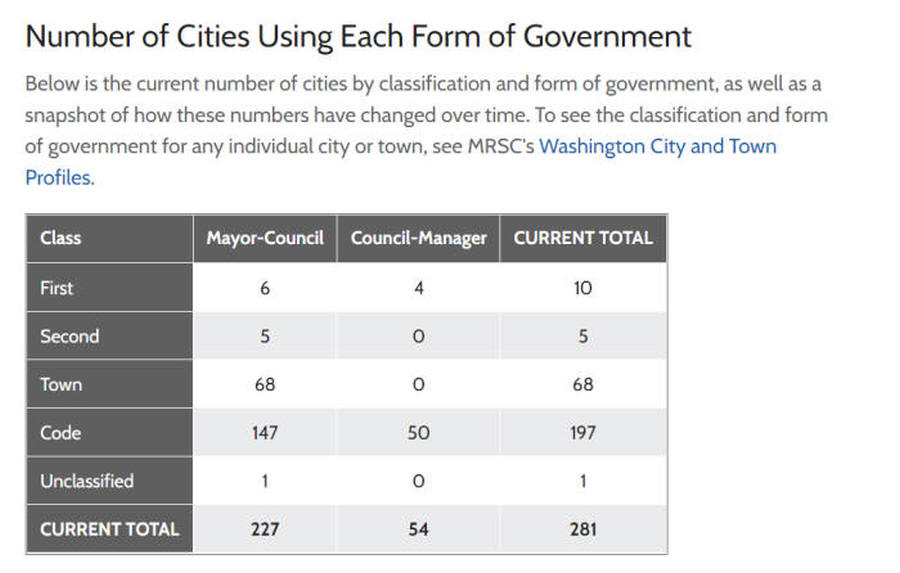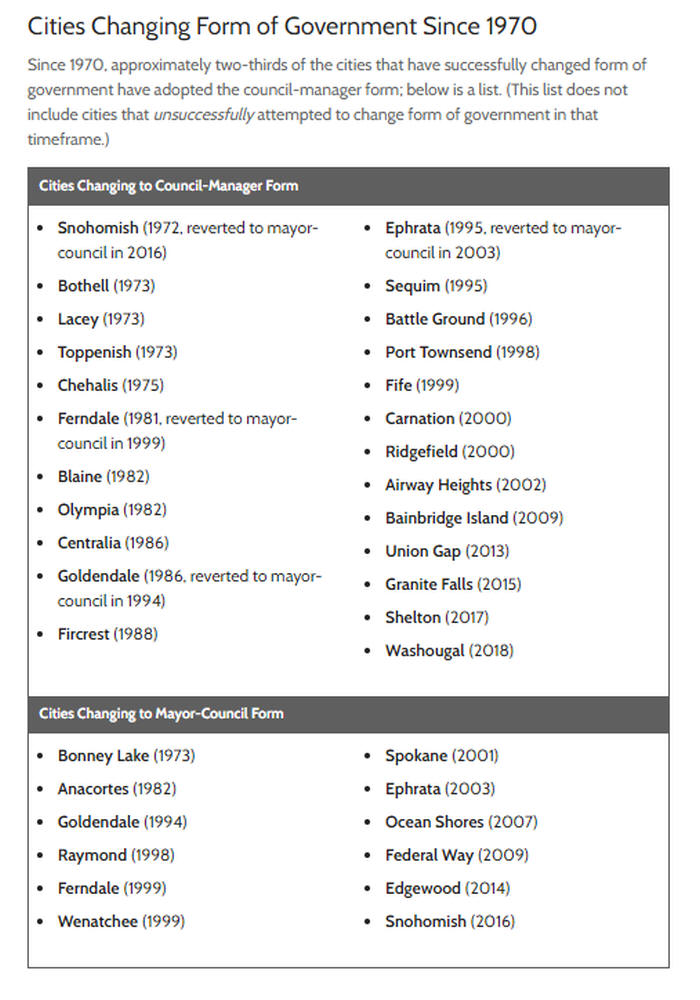Number
of Washington State Cities Using Each Form of Government
Most Cities are Classified as Code Cities.
Nearly Three Quarters of Code Cities
(147/50), and More than Three Quarters of All Municipalities
(227/54) use the Mayor/Council Form.
Wash State
Municipal Governments
Clark
County Municipal Governments
MRSC on City Governments
Camas Change Efforts

Retrieved 12/8/22 from:
https://mrsc.org/Home/Explore-Topics/Governance/Forms-of-Government-and-Organization/City-and-Town-Forms-of-Government.aspx#number
|
Cities Changing Form
of Government Since 1970, The Year the Council/Manager
Option First Became Available, So a Rush for Something New.
Note the cities that
reverted back to Mayor/Council. Other cites that changed to
Mayor/Council were originally incorporated as
Council/Manager, together a significant number.

Retrieved 12/9/22 from:
https://mrsc.org/Home/Explore-Topics/Governance/Forms-of-Government-and-Organization/City-and-Town-Forms-of-Government.aspx#list
|
MRSC Document:
Common Issues and Pro/Con Arguments in Elections to Change
Form of Government
"Arguments
Against the Council-Manager Form
Critics of the
council-manager plan argue the following:
The
council-manager form gives too much power to one person -
the city manager.
A professional manager, often chosen
from outside the city, does not know the community and is
too far from the voters.
Councils may leave too much decision
making to the manager, who is not directly accountable to
the public.
Without an elected chief executive,
the community lacks political leadership.
The council-manager form is too much
like a business corporation which is not suitable for
managing community needs.
Citizens may be
confused about who is in charge. Most expect the mayor to
respond to their problems. The mayor has no direct control
over the delivery of services and can only change policy
through the city council.
City managers may leave a city when
offered higher salaries and greater responsibilities."
|
Which Form Of City Government
Is Best?
Mayor/Council/Administrator or Council/Manager?
The Mayor/Council/Administrator form of city
government is consistent with the
Common Good principle of
Subsidiarity, which advocates for keeping the control of
government as close to the electorate as is practical. The
Council/Manager form is a bureaucratization of city
government, effected by moving decision making authority
from elected officials to staff (mayor to manager). The
Mayor/Council/Administrator form has a balance of power
between the executive (mayor) and legislative (council)
branches, whereas the Council/Manager form of city
government "is too much like a business corporation which is
not suitable for managing community needs," and "without an
elected chief executive, the community lacks political
leadership." (Both
opinion quotes sourced from Municipal Research and Service
Center).
|
MRSC Document:
Commentary: The Unofficial Role of the Administrator
"Many
communities, looking for the benefits of professional
management without the requirement of going through a formal
election to change the form of government, have chosen to
create a position similar to that of a city manager, but
under the authority of the mayor. The resulting hybrid form
of government is often described as being “the best of both
worlds” that includes elected leadership with professional
management of day-to-day local operations. Having worked in
such a position for nearly my entire professional career in
local government, I can answer the question “Is it truly the
best of both worlds?” without the slightest sense of irony
or hesitation: “yes and no.” "
|
Subsidiarity Means Local Control
Links to some Subsidiary
articles
|
|
Clark
County Council Manager/Council Form of Government
‘One of the hardest jobs I’ve ever had’
Karen Bowerman and Gary Medvigy
reflect on their years as Clark County Council members,
the reasons they’re leaving and the work still to be
done
Columbian, June 10, 2024
Excerpt:
"County charter cited Both
Bowerman and Medvigy said they chose not to run for
reelection because of the way the county charter is
written: It separates the powers of the legislative
branch (the elected county council) from the executive
(the appointed county manager).
“If you look at
the way the charter was constructed … the separation of
the legislative and executive branches was key,”
Bowerman said, adding that the charter places strict
limits on what the council can do.
“All the capacity is with the executive,”
Medvigy said.
“It means that for us, as
individual councilors, when we come upon an issue that
needs resolution through the county bureaucracy, we have
one path.
That is through the county manager.
Otherwise, we are ‘interfering,’” Bowerman said.
While Bowerman said she is completely supportive of
County Manager Kathleen Otto, she said the charter
language creates a bottleneck.
Medvigy did have
suggestions for whomever wins his seat.
“In order
for us to fulfill our role as county councilors, we need
to sit down with the manager at the beginning of the
year and say, ‘Here are our priorities. Here’s what’s
going well. Here’s where we would like to see
improvement, and we would like to measure that
improvement in a few months.’ Then, at the end of the
year, do an evaluation,” he said.
That kind of
end-of-year evaluation is common practice elsewhere but
isn’t in the charter or the county manager’s contract,
Medvigy noted."
|
|